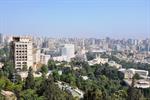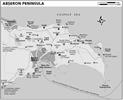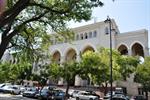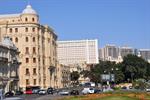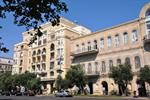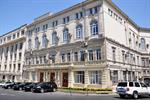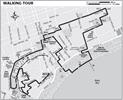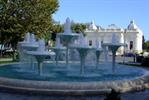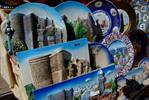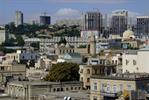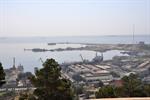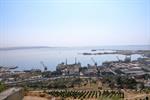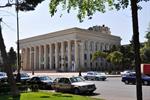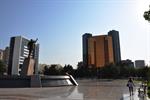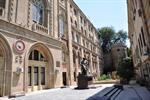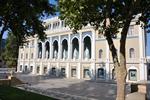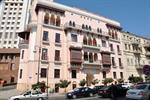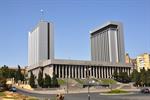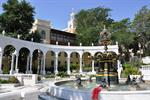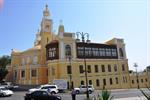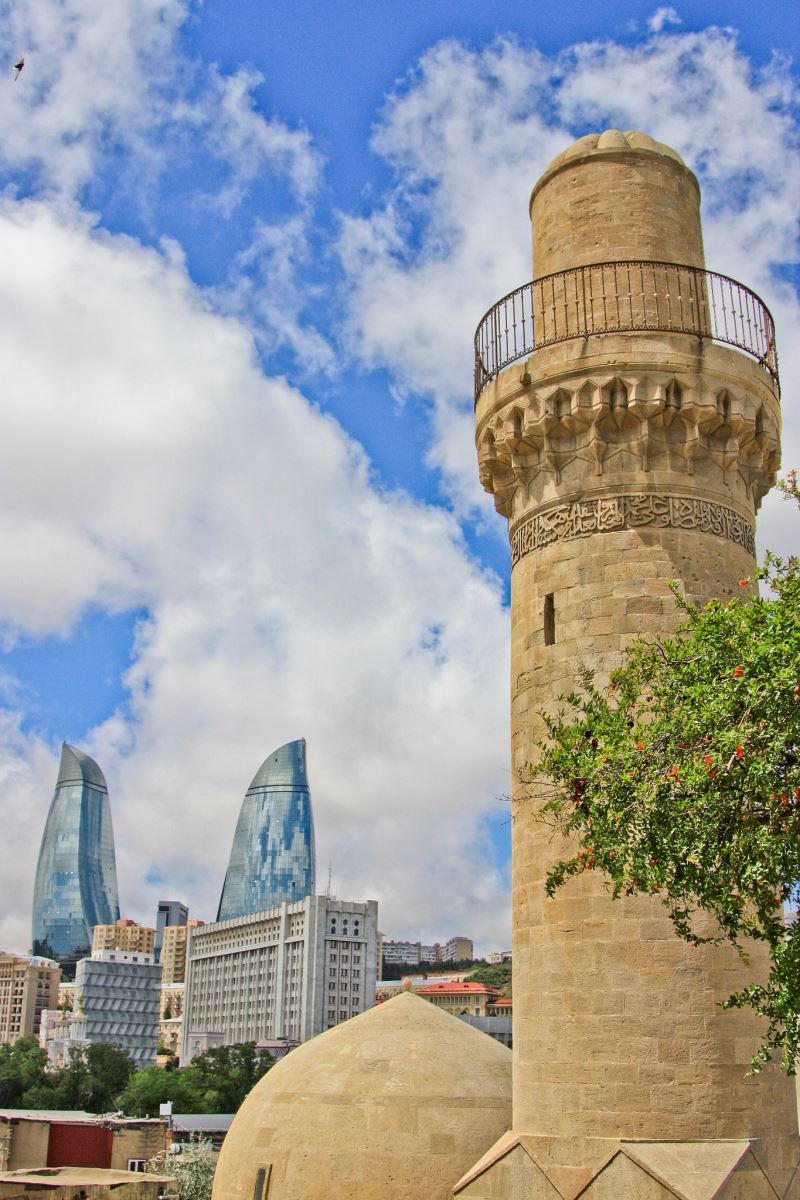 Baku, the capital of Azerbaijan, is the largest city in the Caucasus. With 1.7 million people, it was the fifth-largest city in the entire Soviet Union. On paper, it is the most prosperous of the Caucasian capitals, although most of the prosperity is a result of foreign investment. The actual Azerbaijani citizens do not see much of the money unless they happen to work in the service industries, such as running a restaurant that caters to foreigners. The origin of the city’s name is disputed. Some claim it comes from the Persian bad kube, which means 'city of winds'. Others claim it is derived from an ancient word meaning 'sun' or 'god' because it was connected with Zoroastrian religious rituals. There is evidence that people lived in the area during prehistoric times, but the first mention of it as a true city appears in the ninth century A.D. It flourished as a port and trading center in the Middle Ages, in large part because it has one of the best natural harbors on the Caspian Sea.
Baku, the capital of Azerbaijan, is the largest city in the Caucasus. With 1.7 million people, it was the fifth-largest city in the entire Soviet Union. On paper, it is the most prosperous of the Caucasian capitals, although most of the prosperity is a result of foreign investment. The actual Azerbaijani citizens do not see much of the money unless they happen to work in the service industries, such as running a restaurant that caters to foreigners. The origin of the city’s name is disputed. Some claim it comes from the Persian bad kube, which means 'city of winds'. Others claim it is derived from an ancient word meaning 'sun' or 'god' because it was connected with Zoroastrian religious rituals. There is evidence that people lived in the area during prehistoric times, but the first mention of it as a true city appears in the ninth century A.D. It flourished as a port and trading center in the Middle Ages, in large part because it has one of the best natural harbors on the Caspian Sea.
Though known to very few Westerners until the recent oil boom, Baku was one of the five biggest cities in the USSR and before that the world's most important petro-town. Baku was significant in the fortunes of such varied characters as Stalin, Zarathustra, Shell Oil, Gary Kasparov and the Nobel Prize. Lust for its oilfields was the main reason Hitler marched east and got bogged down in WWII.
Few cities in the world are changing as quickly and nowhere else in the Caucasus do East and West blend as seamlessly or as chaotically. Battered Ladas race shiny Mercedes past illuminated stone mansions, shiny glass towers and tatty old Soviet apartment blocks. History meets modernity on every corner of this metropolis. The Old City’s patchwork of sandy rooftops draped in rich, traditional tapestries contrasts with modern ‘new town’ buildings in the shape of crescent moons and flames. Back in the early 20th century, Azerbaijan went through its first oil boom, and architects from all over Western Europe were commissioned to design buildings for the expanding city. The result is a charming mix of architectural styles, genuinely beautiful buildings that line the city's traffic-choked streets.
Pedestrianised tree-lined streets in the elegant centre chatter with teahouses and buzz with expat pubs. Unesco World Heritage status tries to slow the corporate gentrification of the fascinating Old City (Icheri Sheher) hemmed in by an exotically crenellated arc of medieval fortress wall. Romantic couples defy Islamic stereotypes by canoodling their way around wooded parks and handholding on the Caspian-front bulvar (promenade), whose greens and opal blues make a mockery of Baku's desert-ringed location.
Despite hosting the popular Eurovision ‘music’ competition in 2012 and 1st European Olympic Games in 2015, Baku (and really all of Azerbaijan) remains as yet a pretty uncommon stop on the tourist trail. For the average traveler, Baku is really split into two main areas. The historic Old Town with the Caspian Corniche just outside, and the entire rest of modern Baku beyond that. The Old Town is a small but engrossing maze of old doors and old buildings and old men selling old trinkets, whereas the newer town even just outside is part post-Soviet construction and part modern development.
The Old City is very cool, with Maiden's Tower and slightly overrated Shirvanshahs Palace. Up the hill is the sobering, but scenic Martyr's lane. Not to mention seemingly countless theatres with a wide range of shows. And of course there are more bars and pubs than you can shake a stick at. Parks and the Boulevard make for nice walking. And there's even a little ferry out into the Caspian.
Towering above the city is perhaps Baku's most impressive sight, the Flame Towers. Inspired by Azerbaijan's nickname, the "Land of Fires", these three flame-shaped towers dominate the skyline, and have become something of a national symbol since they appeared in 2012. By night, huge LED displays give the appearance of flames licking the sides of the buildings.
If you're planning a trip to Baku you may need: 1) A wide selection of accommodation options in Baku (basic hostels, budget hotels for unpretencious travelers, small size family run hotels, international business hotel chains). 2) Practical information for tourists (visa regime, prices, best time to vizit and etc). Please do not hesitate to contact us for consultation



